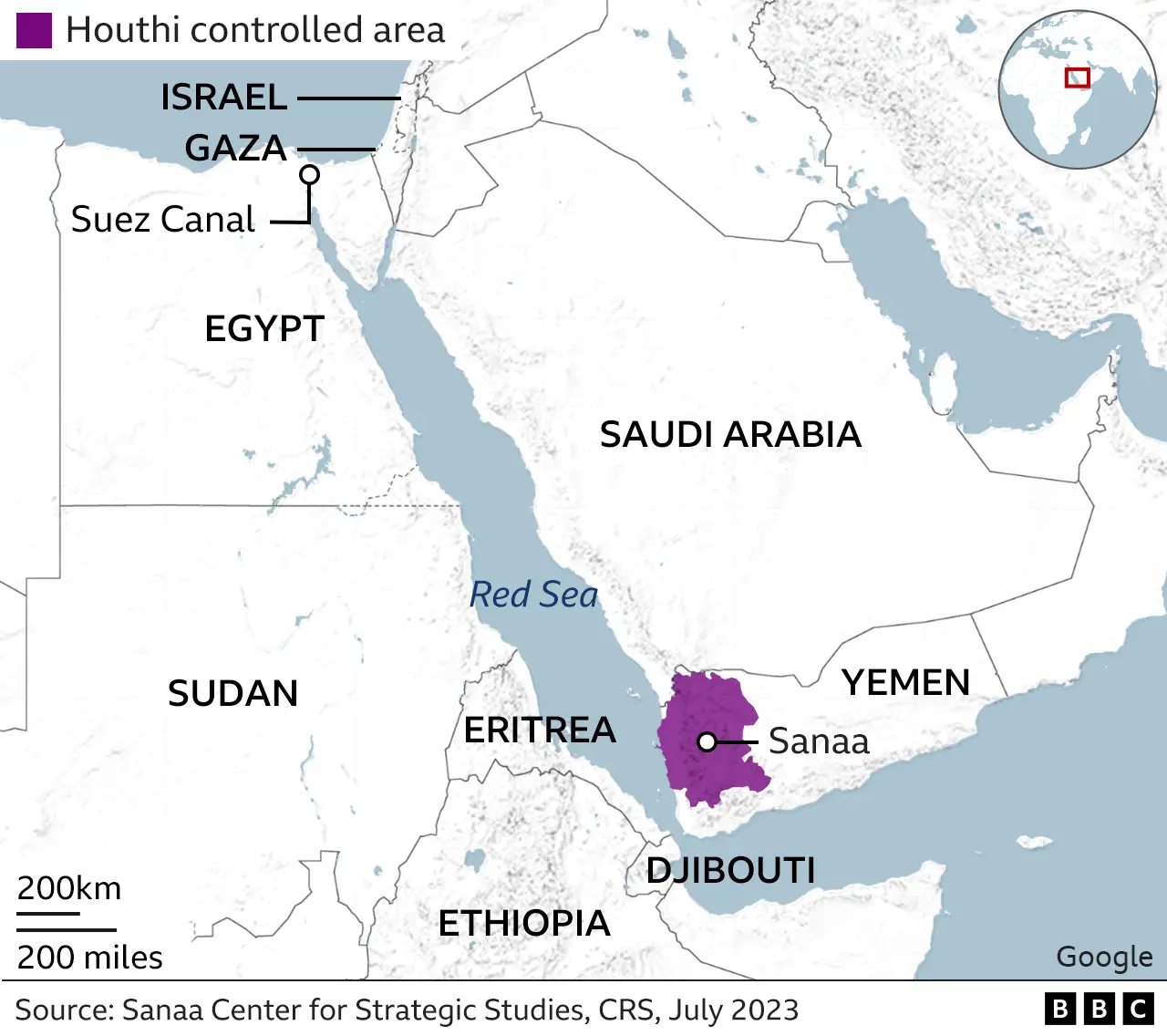UK and US strikes on Houthi sites in Yemen are self-defence, says Rishi Sunak
The UK has acted in self-defence attacking Houthi sites in Yemen, Rishi Sunak has said.
The UK and US launched targeted strikes on military facilities overnight following attacks by the armed group on ships in the Red Sea.
Mr Sunak stressed the action was "necessary, proportionate, and targeted" to protect lives and commercial shipping.
In response, Houthi officials warned the UK and US will "pay a heavy price".
The US-led strikes are the first against the Houthi militia since it started targeting international shipping last year.
The Houthi movement is a political and military group which controls a large part of Yemen and says it is supporting Hamas by targeting ships heading to Israel.
More than 60 targets at 16 locations used by Houthis in Yemen were struck, the US Air Force said.
Speaking during a visit to Ukraine, the prime minister said the UK "acted in self-defence" following the Houthis' targeting of ships, including a Royal Navy warship on Tuesday. He has called on the group to stop the attacks.
"We've seen a significant increase in in the number of Houthi attacks... that's putting innocent lives at risk. It's disrupting the global economy, and it's also destabilising the region," Mr Sunak said.
"And it's why I made the decision with allies to take what I believe to be necessary, proportionate and targeted action against military targets, to degrade and disrupt Houthi capability."
He said: "It's clear that this type of behaviour can't be met without a response, we need to send a strong signal that this breach of international law is wrong."
Initial indications are the strikes have been successful, according to the Mr Sunak.
The Ministry of Defence (MoD) said Royal Air Force typhoons conducted two precision strikes on Houthi sites, including an airfield used to launch drones and missiles over the Red Sea and another site used to launch attack drones.
'Limited... necessary'
Armed Forces Minister James Heappey said there were no further air strikes "immediately planned".
The strikes have also been backed by Labour Party leader Sir Keir Starmer, who was briefed by the government on Thursday night.
"Clearly the Houthi attacks in the Red Sea have to be dealt with," he told BBC Radio 5 Live's Breakfast programme.
But Liberal Democrat foreign affairs spokesperson Layla Moran called for Parliament to be recalled immediately for a retrospective vote on the strikes, and asked if the UK was being drawn into something that risked it being on the frontline in a region she described as a "tinderbox".
The SNP have also said any military action should be scrutinised in the Commons.
The prime minister said he will make a full statement in Parliament and take questions on Monday.
The government has also published a summary of its legal position for the military strikes. It stated the UK was permitted under international law to use force when acting in self-defence.
Former head of the British Army Lord Dannatt told the BBC there was responsibility on the UK and US as permanent members of the UN Security Council to take action to protect world trade.
"One has to hope that this is calculated measured intelligence-led activity, which will have an effect quite quickly and restore international shipping to be able to use the Red Sea as opposed to going around the very expensive Cape of Good Hope route."
Where is Yemen and where did the air strikes happen?


Former UK national security adviser Lord Ricketts said the strikes on Houthi sites were "inevitable" when the group ignored warnings and following the attack on US and UK naval ships on Tuesday.
"I think [the US-led coalition] tried to make it large enough to send a very powerful message but equally being clear its targeted against the attacks on shipping, it's not the declaration of war against the Houthis more generally," he told BBC Radio 4's Today programme.
Responding to the attacks, a Houthi leader warned the US and UK will "soon realise" that the strikes on Yemen were "the greatest folly in their history".
The group maintains they will continue attacking ships in the Red Sea heading to or associated with Israel.
"We affirm that there is absolutely no justification for this aggression against Yemen, as there was no threat to international navigation in the Red and Arabian Seas," spokesman Mohammed Abdulsalam said.
Houthis control north Yemen, capital Sanaa and the Red Sea coastline. The armed group declares themselves to be part of the Iranian-led "axis of resistance" against Israel, the US and wider West.
Yemen expert Dr Elisabeth Kendall, from the University of Cambridge, said she did not think Houthis wanted war with the US, but conflict could help them domestically and increase their leverage in talks with Saudi Arabia, which wants to end its nearly decade long conflict with group.
"You can do a lot of damage as a small group without very sophisticated weapons when you're sitting at the mouth of ones of the world's most important trade routes," she told BBC News.

More on the US-UK strikes in Yemen

Russia has requested an emergency meeting of the UN Security Council over the strikes. It will take place on Friday afternoon.
Meanwhile, Saudi Arabia's foreign ministry expressed "great concern" over the air strikes.
On Wednesday the UN Security Council passed a resolution demanding an immediate end to Houthi attacks, with the text endorsed the right of UN member states to defend their vessels.
Some major shipping lines and oil giant BP have diverted vessels around southern Africa, adding time and costs to journeys.
If the crisis continues, the increased costs could be passed on to consumers, hampering efforts to curb inflation and reduce interest rates.

Sign up for our morning newsletter and get BBC News in your inbox.

